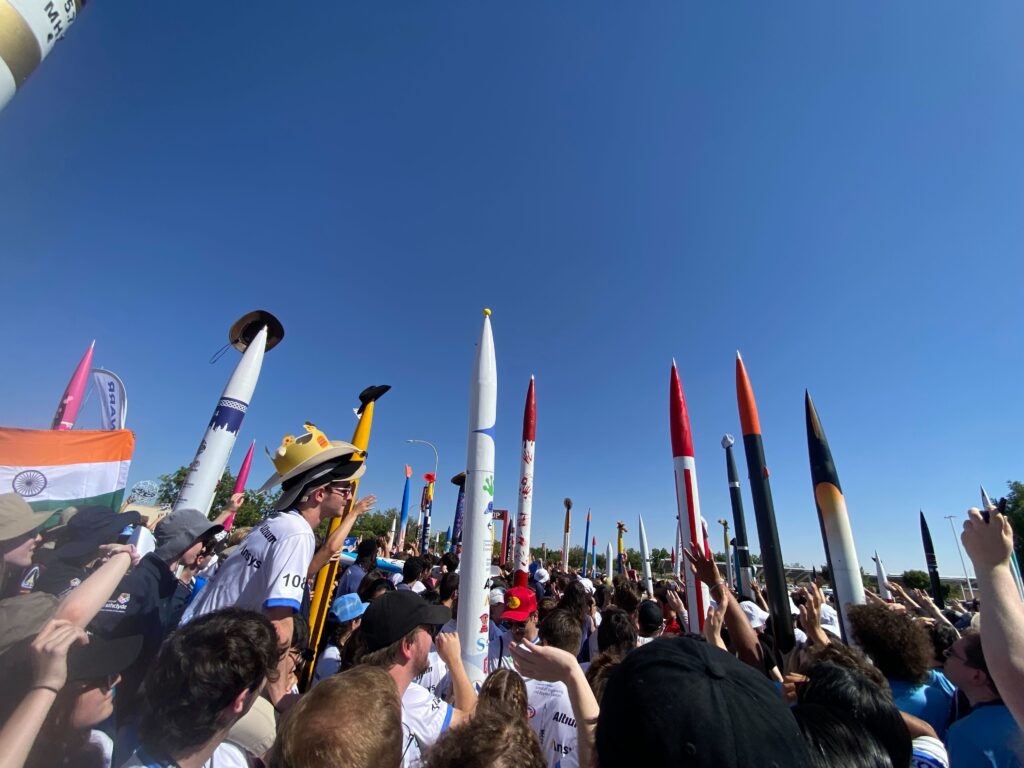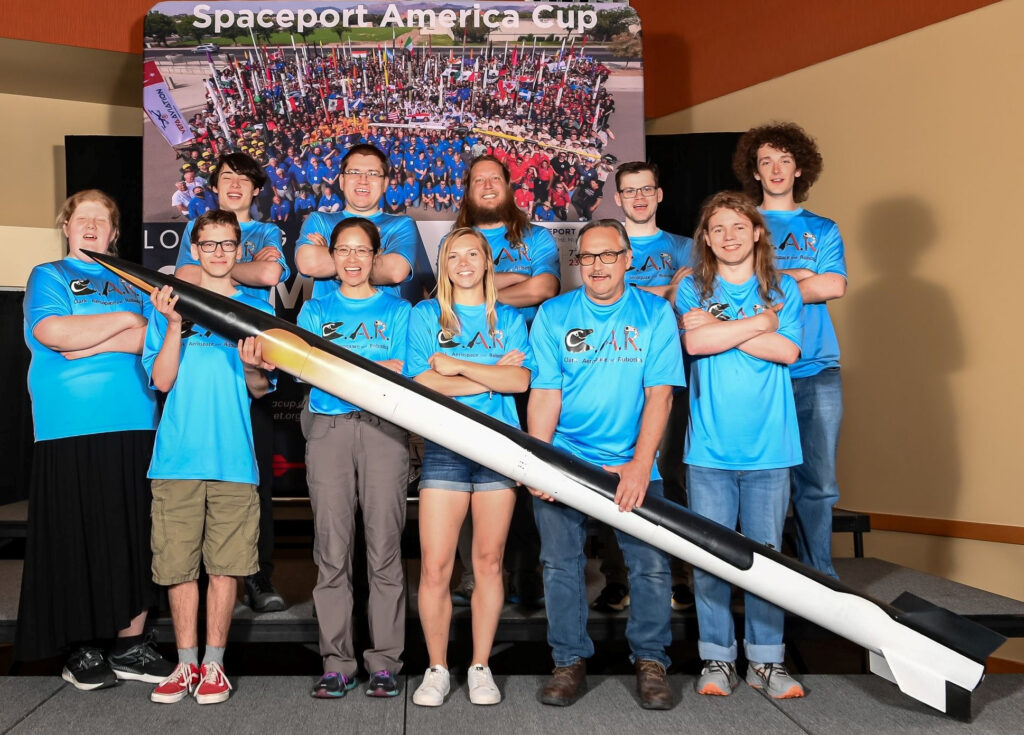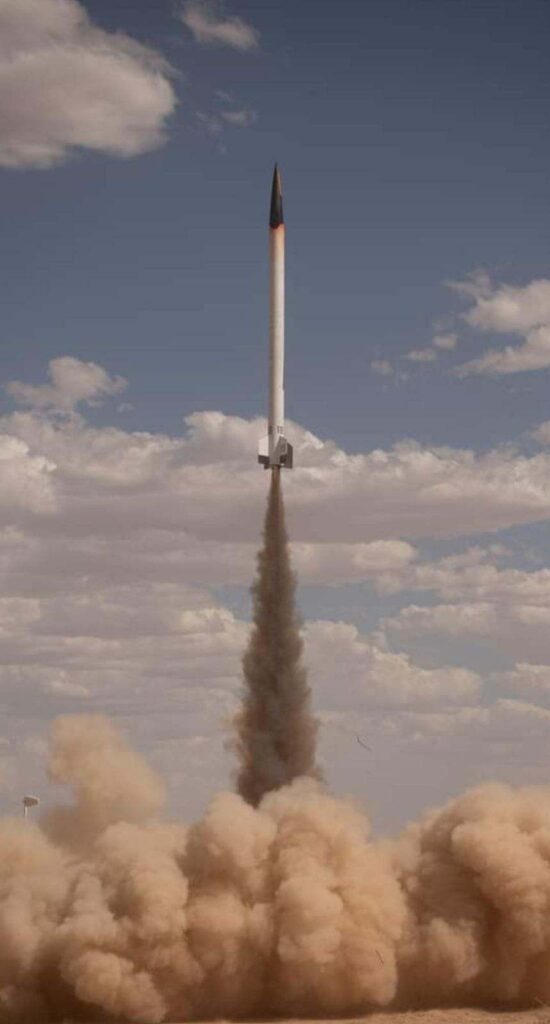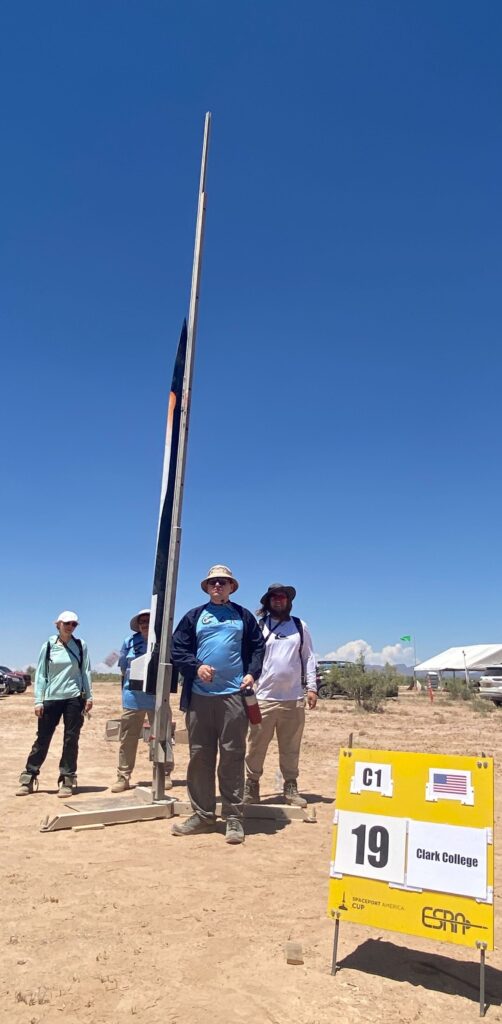Spaceport America Cup

The Clark Aerospace team launched its rocket, Emperor Penguin, at the Spaceport America Cup competition in Las Cruces, New Mexico on June 19. The event is the world’s largest Intercollegiate Rocket Engineering Competition (IREC) for student rocketry teams. A total of 6,153 rocketeers representing 152 institutions in 20 nations participated in the June 17-22 competition. Clark College was one of only three community colleges that participated.
Arriving at Spaceport
Xiunu “Sophie” Lin, Ph.D., professor of physics and director of Clark’s Aerospace student program, sent this email greeting to all Clark staff and faculty from the event: “I am excited to share that the Clark College rocketry team, consisting of 11 travelers (2 advisors, 1 mentor, and 8 students, including 4 minorities—females and LGBTQ+) have all safely arrived in Las Cruces, New Mexico to compete in the 2024 Spaceport America Cup Competition. We will be competing in the SRAD (Student Researched and Developed Motor) 10,000-foot category.”

Clark Aerospace students who participated in Spaceport America Cup:
- Ethan Lloyd Walters
- Vyacheslav Timofeyevich Lukiyanchuk
- Alex Ramsey Kari
- Rebekah Anne Irvin
- Mia Juniper Autumn
- Sydney Anne Erickson
- Max Vaughn Baugess
- Bladen Boone Mitchell
Professor Lin said, “Applaud for these students for the hard work they put together to make this launch possible.”

Clark Aerospace rocket specs:
- Spaceport America Cup team number: 19
- Rocket name: “Emperor Penguin”
- Length: 122 inches
- Weight: 71 pounds
Professor Lin explained that each team must work efficiently and compete to launch their rocket as early as possible. Teams that launch during the first two days earn extra points. The Clark Aerospace rocketry team passed the safety check for their rocket on Monday, the first day of competition. They made the recommended changes on Tuesday, and had their rocket ready for launch on Wednesday, the event’s first launch day.
Launches are halted if the surface wind speed is higher than 18 miles per hour. Clark’s rocket was on the launch pad and ready to be launched when winds suddenly gusted up to 24 miles per hour, causing event officials to halt all launches until the wind calmed down. Five minutes later, launches resumed.
Professor Lin said, “The rocket’s M motor was armed, and after 5 to 8 seconds of delay, it took off beautifully, leaving a trail of black-brown smoke behind.”
She sent this email update to Clark faculty and staff: “Yesterday, we launched our rocket before a thunderstorm hit the launch area, destroying the majority of the tents, and halting the rest of the launches that day.”
She added, “As the team advisor, I want to share that our journey to complete this project has been challenging. I often describe my experience as riding a roller coaster. It is a significant achievement that we made it to this competition. Clark College’s rocketry team is the only community college competing in the 10K SRAD (Student Researched and Developed) category. Our students have put in tremendous time and effort to build this project, wandering through many failures before they can make this journey possible. They are proud and excited to represent Clark College in this competition.”
- View Clark Aerospace launching “Emperor Penguin” rocket: First see the rocket’s introduction from 6:45:25-6:46:09, and then the launch starting at 6:50:46 here: 2024 Spaceport America Cup | Day 1 Launch (youtube.com)
- Read an earlier Clark 24/7 News story about the team’s April 2024 rocket test launch in the desert in Brothers, Oregon here
- Videos of Clark Aerospace’s Journey to the 2023 Spaceport America Cup
Emperor Penguin Rocket Timeline
Fall 2023: A team of six Clark students, an advisor, and a mentor was organized by the Clark Aerospace program to build a rocket for the 2024 Spaceport America Cup. The team spent about six months building the rocket for the competition. After flight tests and modifications, they had a rocket ready for the competition.

April 19, 2024, in Corvallis, Oregon: First Static Test on a 4-grains SRAD (Student Researched and Developed) motor under the help and support from the Rocketry team from Oregon State University. The test was conducted using a structure assembled by our own students.
April 26, 2024, in Brothers, Oregon: First test launch of Clark Aerospace’s Spaceport America contender, Emperor Penguin in the central Oregon desert. Professor Lin said: “The rocket soared to an altitude of 7,200 feet before safely landing approximately 0.5 miles from the launch pad. Despite a glitch in the GPS system onboard the rocket, the team successfully located it utilizing a radio tracker, with an unexpected assist from a team member and her dog, who managed to find the rocket before the radio tracker.”
May 18-19, 2024, in Brothers, Oregon: Second Static Motor Test on a 4-grains SRAD motor that measured both pressure and thrust.
June 2, 2024, in Brothers, Oregon: Third Static Motor test of our SRAD 6-grain motor for the ERSA competition. Performed above expectations, with expected pressure and higher than expected thrust.”
June 19, 2024, in Las Cruces, New Mexico: At Spaceport America Cup: Clark Aerospace students successfully launch their rocket, Emperor Penguin.
Clark Aerospace
The next challenge for Clark Aerospace: Building their project to compete in the next Spaceport America Cup competition in June 2025. The team plans to make their own motor, build a six-inch diameter rocket, and compete in the SRAD (Student Researched and Designed) 10,000-foot category.
Interested in joining? Clark Aerospace is looking for interested Clark students to join them. No prior experience with rockets is required. Clark’s Aerospace Club actively participates in science, technology, engineering, and math-based experiential project/aerospace design competitions, and students also attend launch events, museums, and aerospace-related activities. Email Clark Aerospace at clarkaerospace1@gmail.com
About Spaceport America Cup
Spaceport America Cup is the world’s largest intercollegiate rocketry conference and competition held in Las Cruces, New Mexico annually in June at Spaceport America, the world’s first purpose-built commercial spaceport. Spaceport America Cup is made possible by a partnership between Spaceport America and the Experimental Sounding Rocket Association (ESRA).
The event showcases the technical prowess of thousands of the world’s most intellectually gifted college students centered around the field of intercollegiate rocketry. During the event, 36 awards were presented. The 2024 Spaceport America Cup winner was University of Maryland; runner up was Istanbul Technical University.
2024 Spaceport by the numbers
- 6,153 total participating rocketeers (77% male; 23% female)
- 152 teams
- 86 U.S. teams representing 35 states
- 66 international teams representing 6 continents
- Teams represented 20 countries: Algeria, Argentina, Australia, Brazil, Canada, Germany, India, Italy, Mexico, New Zealand, Peru, The Philippines, Poland, Romania, Spain, Taiwan, Thailand, Turkey, United Kingdom, United States
Learn more about Spaceport America Cup here.
Photos courtesy of Xiunu “Sophie” Lin, Ph.D.